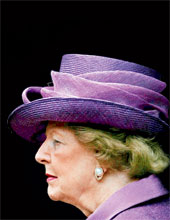 |
London, April 8: Margaret Thatcher, one of the most loved and loathed political figures of the 20th century, died today following a stroke. She was 87.
Looking back on Thatcher’s period in office, it is apparent much of her appeal lay in her being perceived as a strong leader — a factor already in play in India in the run-up to the next general election.
On economic policy, for example, she made it clear the country would have to persist with her tough medicine. “The lady is not for turning,” is a line that came to be associated with her.
Her economics — motivated by an unshakeable belief that free markets would build a better country than reliance on governments — is unlikely to find vocal political support in India. But there will be many admirers of her persona, who will pick and choose the characteristic that will suit them most.
Narendra Modi, a contender to the Iron Man pantheon that has quite a few occupants, is said to be a Thatcher admirer and that the only film he saw in the recent past was The Iron Lady, based on her life and times.
Mamata Banerjee, whose humble origins have some similarities to Thatcher’s beginnings as a grocer’s daughter, can focus on the many hurdles both had to cross to get to the top job but there is an important difference.
Once in power, Thatcher did not show an ounce of doubt and knew what to do.
Mamata condoled Thatcher’s death, focusing on their similarities rather than the yawning differences in their economics.
“I am deeply saddened…. She is widely known as ‘Iron Lady’ as a mark of her uncompromising politics and leadership style. She fought hard for the common people to give them due recognition and position in the society,” the Bengal chief minister said in a message.
 |
Mamata also referred to Thatcher’s “famous statement on being Prime Minister for the first time — ‘where there is discord, may we bring harmony. Where there is error, may we bring truth. Where there is doubt, may we bring faith. And where there is despair, may we bring hope’.”
Again, there is a crucial difference. Thatcher relished swimming against the tide. “You don’t follow the crowd,” she often said. “You make up your own mind.”
Thatcher did — and presided over one of the most divisive political and economic transitions in modern times. Harmony, despite Thatcher’s assurance, was not one of her accomplishments.
But in office, Thatcher was able to deliver.
She ushered in a period of prosperity to a country which had previously been ridiculed as “the sick man of Europe”.
As Mamata spends the night in New Delhi and prepares for talks with the Centre, that is a question she can ask herself: has she done everything she could to nurse the sick state of Bengal back to health?
Mamata would find Thatcher’s sell-off list heretical: British Telecom, British Gas, British Airways, Rolls-Royce, British Steel, British Coal….
Thatcher could “handbag” dissenters but she did consult her colleagues and would in the final analysis be persuaded by logical argument — she was the first to realise the West could do business with a communist called Mikhail Gorbachev.
Thatcher had a firm grasp of detail and made sure she briefed herself well, often displaying impatience with ministers and civil servants alike who provided her with shoddy research.
Maybe like Mamata, she had an instinctive understanding of the hopes and aspirations of working class voters but her period in Opposition prepared her for government.
Thatcher also came to have an understanding with Indira Gandhi — who beat the Briton to the Prime Minister’s chair by well over a decade. Both were known as “the only man in the cabinet”.
Thatcher made it a point to attend Indira’s funeral in Delhi after the Indian Prime Minister was assassinated on October 31, 1984. Had the IRA succeeded in blowing up Thatcher at the Grand Hotel in Brighton on October 12, 1984, the roles could have been reversed.
In Thatcher’s own constituency of Finchley in north London, she obviously had the support of Gujaratis. Her years in power, 1979-1990, saw the rise in Britain of Indian entrepreneurs who thrived under her economic policies.
 |











